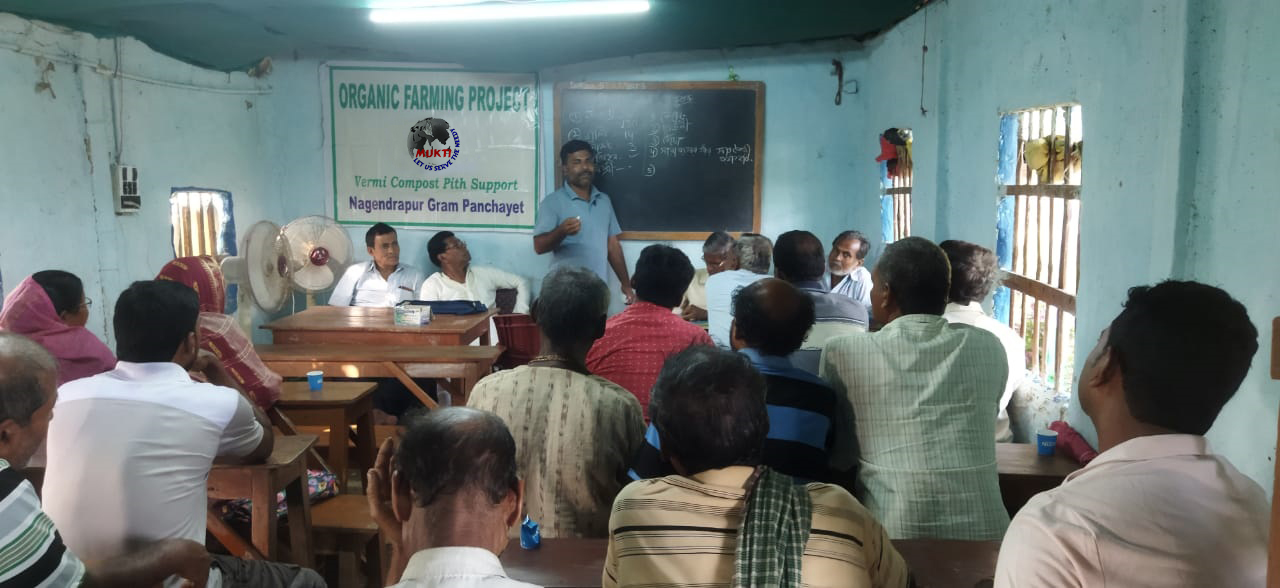

Mukti Conducts Training on Vermicompost
Mukti organized training on vermicompost-making at the Mukti Sustainable Agricultural Movement (SAM) office for 24 organic farmers of Purba Sridhrapur who had earlier been provided with vermicompost pits. The training was scheduled on 28th February 2023. Along with the farmers, Mukti working committee members were present in the meeting. The SAM project coordinator, Mr. Sourabh Kayal, was the trainer for the session.
The farmers were introduced to different species of earthworms, methods of vermicomposting, process and timing of vermicomposting, harvesting, troubleshooting, nutrient content of the vermicompost, and the advantages and benefits of vermicomposting.
Various methods to make vermicompost were described. For all of these, the farmers were asked to use decomposable organic wastes such as kitchen waste, cow dung and other animal excreta, chopped crop residues, and farm residues as raw materials for high-quality compost. After making the compost, red earthworms are to be released on the compost to feed on the decaying organic material. The “castings” from the worms are very important to the fertility of the soil. After digestion, the undigested material moves through the alimentary canal of the earthworm, and a thin layer of oil is deposited on the castings. The castings contain high amounts of nutrients such as nitrogen, potassium, phosphorus, calcium, and magnesium. They also contain other growth-promoting substances and beneficial soil microflora which inhibit the growth of pathogenic microbes.
Project Activities
- About Mukti (2)
- Accreditation (31)
- AGM (63)
- Agriculture Reforms (16)
- ahm2017 (4)
- ahm2017news (2)
- ahm2017runners (2)
- ahm2018runners (1)
- Ambulance Service (2)
- Amplifying Community Voices (9)
- Awards (22)
- Awareness and Empowerment (13)
- Awareness drives (1)
- Book-Bank (13)
- Careers (8)
- CARR (32)
- Ccp1011 (4)
- Chick Rearing Programme for Marginalised Women (5)
- Climate Resilience River Embankment (1)
- Coaching Center (102)
- Community Clinic (2)
- COVID19 (62)
- Cyclone Amphan Relief and Rehabilitation (129)
- Cyclone Bulbul Relief (30)
- Cyclone Relif (2)
- Cyclone Yaas Relief and Rehabilitation (68)
- Editorial (21)
- Editorial by Abir Biswas (1)
- Editorial by Ankita Kothiyal (1)
- Editorial by Kasturi Bakshi (1)
- Editorial by Prof. Pradeep Ray (1)
- Editorial by Ranitendranath Tagore (1)
- Editorial by Sankar Halder (10)
- Editorial by Satyajit Ray (3)
- Editorial by Sohini Mehta (1)
- Editorial by Soumitra Bose (1)
- Editorial by Subhankar Basu (1)
- Education and Enrichment (34)
- Environment and Resilience (9)
- Essential Items Distribution (19)
- Fair/Exibition (1)
- Featured Activities (10)
- Go Green (81)
- Gram Clinic (2)
- Green (20)
- Health (8)
- Health Water & Sanitation (17)
- Hello Beta (1)
- Impact Stories List (31)
- Integrated Development (11)
- Jal hi Kal (2)
- Kerala Flood Relief (3)
- Kitchen Gardening (2)
- Livelihood & Enablement (20)
- Marathon (13)
- MCDF (14)
- Mcdf (112)
- Mcom (6)
- Medical Camp (8)
- MIT (3)
- MKSS (6)
- MSS (11)
- MUKTI Community Shop (1)
- Mukti Craft (2)
- Mukti Cultural (1)
- Mukti Employment (2)
- Mukti Fresh (2)
- Mukti Gram - Egra (2)
- Mukti Gram - Purbashridharpur (8)
- Mukti Gram, Model Village (136)
- Mukti Green (6)
- MUKTI Institute of Technology (MIT) (3)
- Mukti Kishalaya (2)
- Mukti Support (1)
- Mukto Dhara (1)
- NaRKEL (9)
- Obituaries (4)
- Observance Days Celebration (10)
- Organic Farming (3)
- Organic Farming & Training Support (8)
- Pandemic Support (2)
- Pond Rejuvenation (1)
- Prerana (4)
- Projects For Mukti Wide (3)
- Rights and Special Needs (19)
- Riste (2)
- RTI (14)
- Sahosini (3)
- SAM (9)
- Sam (89)
- SDF (9)
- Skill & Enterprise Development (2)
- Skill Enterprise (2)
- star-of-the-week (9)
- STEP (1)
- Success Stories (39)
- Success Story Coaching Center (1)
- Success Story MCDF (6)
- Success Story RTI (1)
- Success Story SAM (9)
- Success Story TSS (20)
- Sundarbans Green (SUN-G) (1)
- Sunderban development fair project (7)
- Sustainable Agriculture (2)
- SWAS (2)
- SwasthoSongini (4)
- Swavlamban Accelerator in Sundarbans (SWAS) (2)
- Talented (2)
- Tour for Cause (31)
- TSK25 2017 (7)
- TSK25 2017 Runners (7)
- TSS (17)
- TSS (112)
- Uncategorized (59)
- Valued Partners (3)
- Vclpk (1)
- Vetp (2)
- View (2)
- VOICE (2)
- workshop (109)